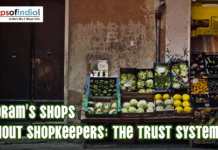The skyrocketing price of fruits and vegetables is not the only issue; so is the amount of pesticide residues these contain. It is surprising to know that most of the vegetables and fruits have an alarming percentage of harmful chemicals, which is far above the permissible limit prescribed by the Food Safety and Standards Authority of India. Even some of the banned pesticides are now part of our diet, such as Cypermethrin, Heptachlor, Quinalphos, Aldrin, Chlorodane, Dichlorvas, Cypermethrin. Some vegetables have been categorized as extremely harmful in terms of levels of pesticide.
In a study conducted by the Kerala Agricultural University, “dangerous levels” of pesticide residues have been found in many main vegetables like cauliflower, cabbage, small red onions, curry leaves, green chillies, etc. About three years ago, Profenofos, which is a second-level pesticide, was banned in India, except for tea and cotton. But its residues have been found in vegetables like gooseberries, green chilli, okra, curry leaves, mint leaves and coriander leaves.
The Delhi High Court had earlier in May this year asked the government to conduct surprise inspection of vegetable and fruit markets at random. It had been found that 90% of the mangoes in the city contained harmful chemicals. Most of these were used to ripen the green mangoes yellow overnight. Some of these chemicals were carcinogenic.
What are we consuming?
We are literally consuming poisons. Let’s have a brief look:
- Brinjal: Chemical found is Heptachlor, 860% above the legal limit
- Cabbage: Chemical found is Cypermethrin, 95.5% above the legal limit
- Okra: Chemical found is Heptachlor, 55% above the legal limit
- Rice: Chemical found is Chlorfenvinfos, 1324% above the legal limit
- Banana: Chemical found is Chlorodane, 54% above the legal limit
- Cauliflower: Chemical found is Aldrin, 320% above the legal limit
- Apple: Chemical found is Dichlorvas, 140% above the legal limit
Health concern
Consuming pesticide-laden fruits and vegetables for a long period of time can prove fatal. Health experts say that pesticides are neurotoxins, affecting the nervous system and other important organs such as liver and kidney. Food poisoning and different sorts of allergies are common from these pesticides. Some pesticides even lead to cancer. Certain pesticides cause skin problems, loss of weight, sleeplessness and irritability.
How can you reduce the percentage of pesticide intake?
We cannot live without eating these but we must be cautious and follow certain guidelines, which are as follow:
- Wash fruits and vegetables thoroughly, about five to six times under running water.
- Blanch fruits and vegetables after washing these. To blanch, cut the vegetables and put these either in hot water or steam these.
- Always peel the fruits and vegetables (if possible) before eating and cooking.
- Do not go for those shiny and extra clean fruits, vegetables, cereals and pulses. These are generally not healthy.
- Buy small vegetables rather than large ones, as chances of pesticides in small vegetables are less.
- If possible, buy organic fruits and vegetables. You can also grow vegetables in pots at home.
- Separate the leaves of cauliflower and then wash these in the vinegar or salt solution (20 mil vinegar in one litre water or 20 gram salt in one litre of water). After this, wash cauliflower leaves under running water.
- We also get pesticide through animal products. To lessen the chances of consumption through animal product, it is advisable to cook in a pressure cooker, bake or fry animal products.
- Boil milk for some time to destroy the pesticide residues.
These are few easy but essential steps. At the same time, the Food Safety and Standards Authority of India should be more vigilant and monitor the fruits and vegetables regularly. But there are many questions that need to be answered: why are the banned pesticides being sold in the market for use? Why the polished cereals and pulses are sold in supermarkets when these are not healthy? If organic food is good for health then why it is so expensive and out of reach? Why everyone is running just after money? The time has come to really think or there might not be any life left to protect.
Read More:
Maggi is Back: Know What was Bad in Maggi Noodles
How Safe Are Instant Noodles?
10 Healthy Alternatives to Maggi Noodles
Food Testing Labs in India
Top 10 reasons why vegetable and pulses prices keep soaring in India
Is Most of India Vegetarian? – An Infographic




